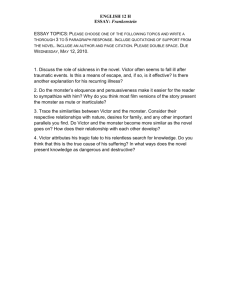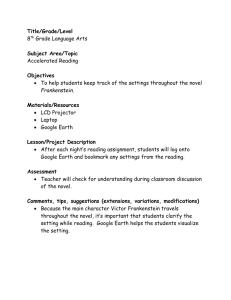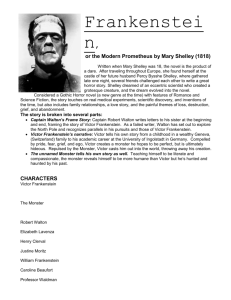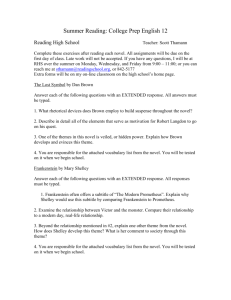Dear Future Pre-AP English II student: Welcome to Pre
advertisement
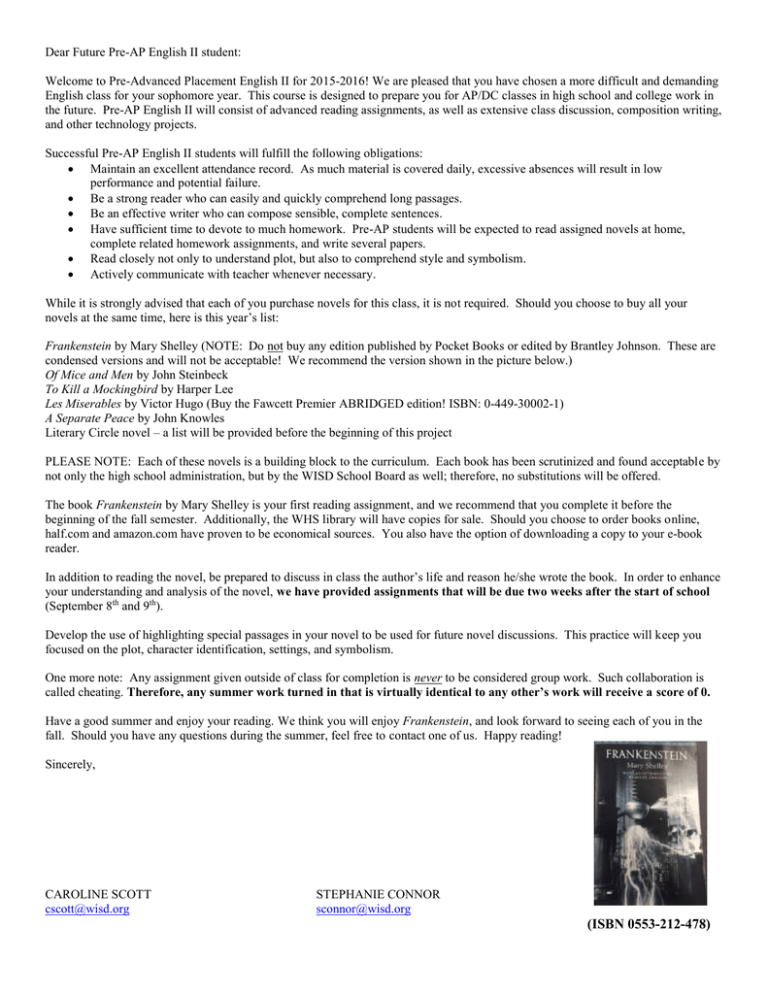
Dear Future Pre-AP English II student: Welcome to Pre-Advanced Placement English II for 2015-2016! We are pleased that you have chosen a more difficult and demanding English class for your sophomore year. This course is designed to prepare you for AP/DC classes in high school and college work in the future. Pre-AP English II will consist of advanced reading assignments, as well as extensive class discussion, composition writing, and other technology projects. Successful Pre-AP English II students will fulfill the following obligations: Maintain an excellent attendance record. As much material is covered daily, excessive absences will result in low performance and potential failure. Be a strong reader who can easily and quickly comprehend long passages. Be an effective writer who can compose sensible, complete sentences. Have sufficient time to devote to much homework. Pre-AP students will be expected to read assigned novels at home, complete related homework assignments, and write several papers. Read closely not only to understand plot, but also to comprehend style and symbolism. Actively communicate with teacher whenever necessary. While it is strongly advised that each of you purchase novels for this class, it is not required. Should you choose to buy all your novels at the same time, here is this year’s list: Frankenstein by Mary Shelley (NOTE: Do not buy any edition published by Pocket Books or edited by Brantley Johnson. These are condensed versions and will not be acceptable! We recommend the version shown in the picture below.) Of Mice and Men by John Steinbeck To Kill a Mockingbird by Harper Lee Les Miserables by Victor Hugo (Buy the Fawcett Premier ABRIDGED edition! ISBN: 0-449-30002-1) A Separate Peace by John Knowles Literary Circle novel – a list will be provided before the beginning of this project PLEASE NOTE: Each of these novels is a building block to the curriculum. Each book has been scrutinized and found acceptable by not only the high school administration, but by the WISD School Board as well; therefore, no substitutions will be offered. The book Frankenstein by Mary Shelley is your first reading assignment, and we recommend that you complete it before the beginning of the fall semester. Additionally, the WHS library will have copies for sale. Should you choose to order books online, half.com and amazon.com have proven to be economical sources. You also have the option of downloading a copy to your e-book reader. In addition to reading the novel, be prepared to discuss in class the author’s life and reason he/she wrote the book. In order to enhance your understanding and analysis of the novel, we have provided assignments that will be due two weeks after the start of school (September 8th and 9th). Develop the use of highlighting special passages in your novel to be used for future novel discussions. This practice will keep you focused on the plot, character identification, settings, and symbolism. One more note: Any assignment given outside of class for completion is never to be considered group work. Such collaboration is called cheating. Therefore, any summer work turned in that is virtually identical to any other’s work will receive a score of 0. Have a good summer and enjoy your reading. We think you will enjoy Frankenstein, and look forward to seeing each of you in the fall. Should you have any questions during the summer, feel free to contact one of us. Happy reading! Sincerely, CAROLINE SCOTT cscott@wisd.org STEPHANIE CONNOR sconnor@wisd.org (ISBN 0553-212-478) Part I—Reading and Annotating the Novel Due date: Be advised that we will start discussing the book on the second day of school. All summer work must be turned in by September 8th & 9th. As you read your summer novel, highlight interesting, important, and/or confusing passages. Additionally, take notes in the margins about topics and questions you may have. This practice is called annotating. If the book is not yours or you would prefer not to write in it, you may strategically annotate on sticky (i.e. Post-it) notes. Simply highlighting the novel is not enough. We will be looking for evidence that the novel was read in its entirety and that you fully comprehended it with all of its complex nuances. You will be graded on the annotations you complete in (or outside of) the novel. While you are not required to annotate every single page, use the suggestions below to help guide your markings: Important plot events or pivotal moments Passages that describe or reveal characterization Any words, images, and details that seem to form a pattern throughout the text. Highlight these and observe the rest of the text closely to see if the author uses other linked words, images, or details. Specifically, look for how “nature reflects the human spirit.” Possible themes/thematic statements–Make predictions and speculate about the meaning or point of each theme. Figurative language–Highlight what you believe are the most significant examples of figurative language (e.g. allusion, irony, symbolism, imagery, metaphor, and personification). Questions you have while you read–Write them down and try to answer them later in your reading. Part II—Written responses Answer FOUR (4) discussion questions: These discussions are meant to be a reflection of your understanding and conclusions made while reading the book; therefore, if you copy from the internet or other sources, you will receive a zero for this test grade. We expect that you will answer all four questions in at least one paragraph (5-7 sentences minimum). Your answers must be TYPED in 12 point, Times New Roman font, with MLA heading. Frank #1: Victor doesn't give his monster a name. What does this do for the story? What do you think most people call the monster “Frankenstein” even though that’s not his name? Frank #2: At its heart, Frankenstein is interested in the question of nature vs. nurture: are people blank slates that are formed by experiences and environment, or are we born with certain traits -- like being evil? What does the book seem to suggest? How do you know? Frank #3: Victor claims that he breaks his promise to create him a companion because he doesn't trust the monster. Is the monster trustworthy? Can Victor be trusted even though he broke his promise? Give specific examples from the text. Frank #4: Shelley emphasizes the importance of family and suggests that the monster would have turned out differently if he'd had people around him who loved and understood him. But the rest of the world would still have hated and feared him. Would a loving family really have prevented tragedy? Give examples from the text as well as at least one real life example from current news or past historical events to answer this question. Frank #5: What is the point of the "frame narrative" (a story within a story)? Why do we begin and end with Robert Walton’s letters? What lesson does Walton learn from listening to Frankenstein’s and the monster’s stories? Frank #6: Why does Victor become obsessed with creating life? Was it wrong for him to inquire into the origins of life? Explain your answer and give modern day examples of science applications that some people don't like. Frank #7: Who is the actual monster in Frankenstein? Justify your answer with specific examples from the text. Frank #8: Why can't Victor tell anyone -- even his father or Elizabeth -- why he blames himself for the deaths of William, Justine, and Henry Clerval? Have you ever had a secret that you just couldn’t tell? Frank #9: One of the novel's tragedies is the inability of the characters to recognize the humanity of the creature. What qualities make us human? Which of the qualities does the creature possess? What qualities does he not have?

